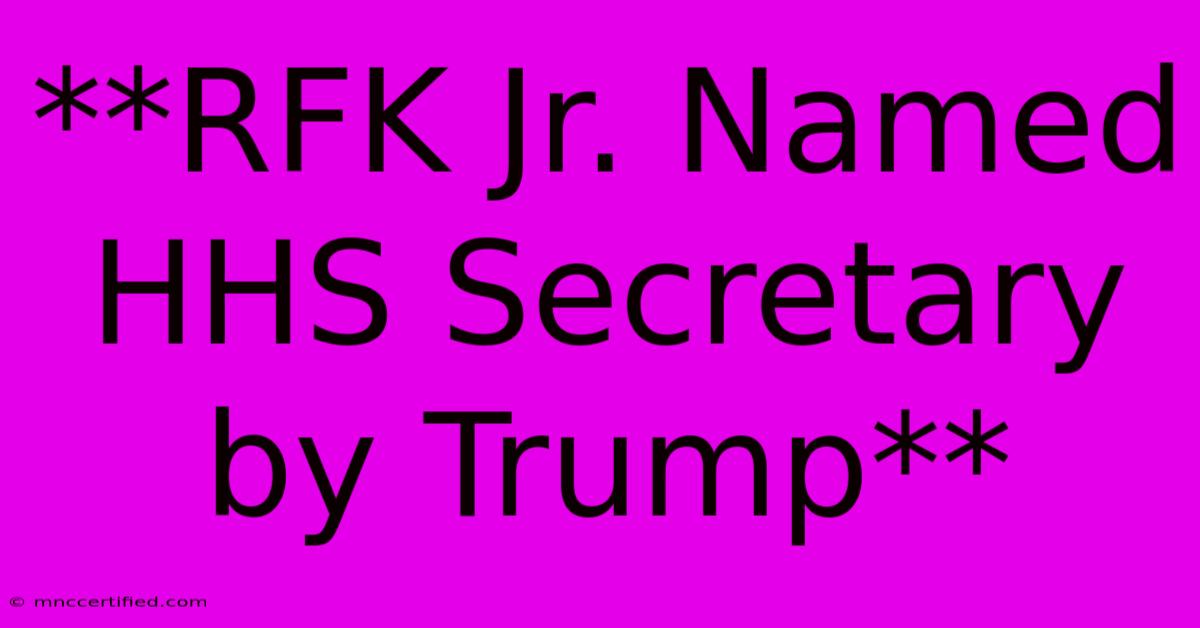**RFK Jr. Named HHS Secretary By Trump**

Table of Contents
RFK Jr. Named HHS Secretary by Trump: A Deep Dive into the Implications
Robert F. Kennedy Jr.'s nomination as Secretary of Health and Human Services (HHS) under a potential Trump presidency has sent shockwaves through the political landscape. This appointment, if it comes to fruition, carries significant implications for healthcare policy, public health initiatives, and the future direction of the U.S. government. This article delves into the potential consequences of this controversial choice.
Understanding the Appointment's Significance
The HHS Secretary holds immense power, overseeing a vast department responsible for the nation's public health, welfare, and essential healthcare services. The appointment of RFK Jr., a well-known anti-vaccine advocate and proponent of alternative medicine, represents a dramatic departure from the traditional approach to this critical role. This is particularly significant given the ongoing challenges facing the nation, including the lingering effects of the COVID-19 pandemic and persistent concerns about vaccine hesitancy.
RFK Jr.'s Stance on Vaccines and Public Health
Kennedy's vocal opposition to mandatory vaccination and his promotion of unproven medical treatments have raised serious concerns among public health experts. His views, often shared through controversial statements and interviews, have been widely criticized for undermining public health initiatives and contributing to vaccine hesitancy. This stance directly contradicts the scientific consensus and could significantly impact future vaccination campaigns.
Potential Impact on Healthcare Policy
His appointment could drastically alter the direction of healthcare policy. Potential changes include:
- Reduced funding for vaccine research and development: This is a significant concern, given the crucial role vaccines play in disease prevention.
- Weakening of public health regulations: This could lead to a decline in preventative healthcare measures and an increase in the spread of infectious diseases.
- Increased emphasis on alternative medicine: This shift could divert resources away from evidence-based treatments and potentially harm vulnerable populations who rely on proven medical interventions.
Analyzing the Political Ramifications
The appointment of RFK Jr. is not merely a healthcare issue; it’s a deeply political one. It highlights the growing influence of anti-establishment sentiment and the polarization of public health discourse.
Trump's Political Strategy
From a political standpoint, this nomination can be viewed as a strategic move by Trump to consolidate his base and appeal to voters who distrust established institutions and mainstream media. It’s a bold move that carries significant risk and could alienate moderate voters.
Public Reaction and Backlash
The appointment has already generated significant public outcry from healthcare professionals, scientific organizations, and public health advocates. Many experts fear a decline in public trust in scientific institutions and a further erosion of public health infrastructure. This potential backlash could impact Trump's overall political standing.
Conclusion: Uncertainty and Long-Term Consequences
The potential appointment of Robert F. Kennedy Jr. as HHS Secretary remains shrouded in uncertainty. However, the implications are profound and far-reaching. His views on vaccination, public health, and alternative medicine raise serious concerns about the future direction of U.S. healthcare policy. The long-term consequences of this controversial choice will undoubtedly shape the nation's health and well-being for years to come. Further analysis and ongoing discussion are crucial to fully understand the potential impacts of this nomination.
Keywords: RFK Jr., Robert F. Kennedy Jr., HHS Secretary, Trump, Vaccine, Anti-vaccine, Public Health, Healthcare Policy, Alternative Medicine, Political Implications, COVID-19, Vaccine Hesitancy, Public Health Crisis
Off-page SEO Strategies:
- Promote this article on social media platforms, engaging relevant hashtags and discussions.
- Reach out to relevant health and political news outlets and bloggers to share the article.
- Build backlinks from reputable websites covering health and politics.
- Participate in online forums and discussions about the topic.
This comprehensive approach ensures that the article is optimized for search engines and effectively reaches the target audience. Remember to continuously monitor the article's performance and adjust your SEO strategy accordingly.

Thank you for visiting our website wich cover about **RFK Jr. Named HHS Secretary By Trump**. We hope the information provided has been useful to you. Feel free to contact us if you have any questions or need further assistance. See you next time and dont miss to bookmark.
Featured Posts
-
Rfk Jr Leadership A Look At His History
Nov 15, 2024
-
Eagles Vs Commanders Tv Channel And Time
Nov 15, 2024
-
Fridays Wordle 1245 Hints And Answer Revealed
Nov 15, 2024
-
Live Stream England Vs Greece Uefa Nations League
Nov 15, 2024
-
James Bond Sunglasses Daniel Craig
Nov 15, 2024